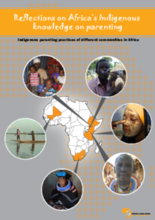This publication, produced by the Parenting in Africa Network (PAN), highlights the skillful parenting practices of several pastoral communities in Africa, including the Gabra and the Maasai people in Kenya, the Bozo community in Mali, the Ndebele of South Africa, and the Swahili community of the coastal strip of Africa. The aspects of parenting highlighted are: pre-birth mother care, post birth mother and child care, instilling skills in responsibility and respect, child-parent interaction, the role of fathers, sexuality and puberty, preparation for marriage, care of vulnerable children, and the role of extended family/living with grandparents.
In order to collect this data, PAN, in partnership with Africa Interactive Kenya Ltd, visited different destinations in Africa to learn and showcase indigenous positive parenting practices that are still used in Africa, but which are under threat because of modernisation. Among the findings from this report are insights into the different traditional care practices of these communities. For example, several of the communities, such as the Swahili and Iteso, emphasize community and kinship care and are raised by parents as well as grandmothers and other extended family or members of the community who help to care for the children. In the Bozo community, the village chief determines where an orphaned child will be placed, typically the closest relatives, who become the adoptive family. The Nbele, too, are traditionally communally responsible for orphaned children and the primary caregivers are elected by the village chief.

